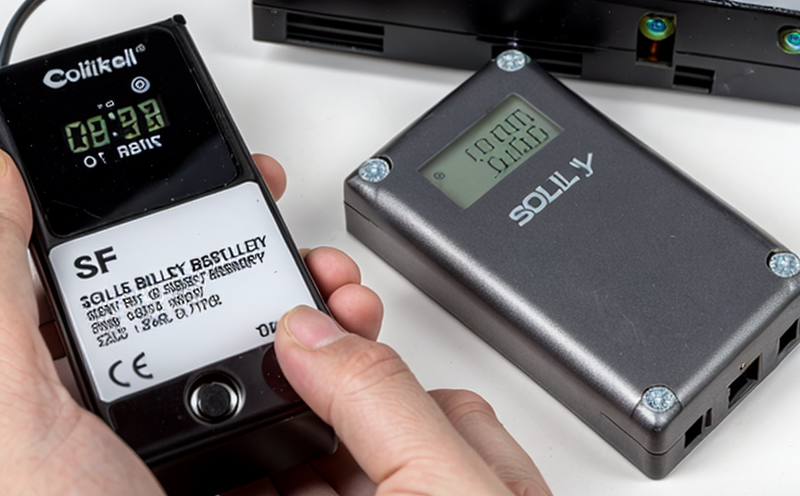GB/T 34013 Solid-State Battery Low Temperature Testing
The GB/T 34013 standard is a crucial tool in ensuring that solid-state batteries meet the necessary performance and safety requirements, particularly when it comes to low-temperature environments. This test method focuses on evaluating the behavior of solid-state batteries at temperatures as low as -60°C, which is critical for applications like electric vehicles (EVs) and other portable electronic devices where extreme cold conditions are common.
Solid-state batteries differ significantly from traditional lithium-ion batteries in their core component. Instead of using a liquid or polymer-based electrolyte, solid-state batteries employ an all-solid electrolyte, which offers superior thermal stability, enhanced safety, and improved energy density. However, this technological advancement also presents unique challenges when it comes to low-temperature performance.
The GB/T 34013 test aims to address these challenges by providing a standardized method for assessing the battery's ability to function under extreme cold conditions. The test involves several critical steps, including specimen preparation, charging/discharging cycles at specified temperatures, and subsequent evaluation of the battery’s performance metrics.
During the testing process, the battery is subjected to controlled temperature changes within a chamber that can achieve -60°C. The specimens are then monitored for their capacity retention, internal resistance, and voltage behavior during both charging and discharging processes. This data provides valuable insights into the battery's stability and reliability in cold environments.
The importance of this testing method cannot be overstated, especially given the growing demand for electric vehicles that operate efficiently even in harsh winter conditions. By adhering to GB/T 34013 standards, manufacturers can ensure their products meet stringent safety and performance benchmarks, thereby gaining a competitive edge in the market.
To perform this test effectively, specialized equipment is required, including cryogenic chambers capable of reaching -60°C and precise measurement instruments. The testing procedure must be meticulously followed to avoid any discrepancies or errors that could skew the results. Compliance with GB/T 34013 not only ensures product quality but also fosters trust among consumers regarding the safety and reliability of solid-state batteries.
Understanding the implications of this test is essential for various stakeholders, including quality managers, compliance officers, R&D engineers, and procurement professionals. These individuals play pivotal roles in ensuring that products meet regulatory requirements and industry standards. By staying abreast of such tests and their applications, they can make informed decisions that impact the design, manufacturing, and marketability of solid-state batteries.
Applied Standards
| Standard Code | Description |
|---|---|
| GB/T 34013-2017 | Test method for low temperature performance of solid-state batteries |
| IEC 62685:2019 | General technical requirements for safety of rechargeable portable energy storage systems (including electric vehicles) |
| ASTM D7849-13 | Standard test method for low temperature resistance of lithium-ion cells and batteries |
The GB/T 34013 standard is part of a broader framework aimed at ensuring the safety, performance, and reliability of solid-state batteries. It aligns with other international standards such as IEC 62685 and ASTM D7849, which also address low-temperature challenges in battery technology. By adhering to these standards, manufacturers can ensure their products meet global regulatory requirements and industry best practices.
The table above highlights the key standards that guide the GB/T 34013 testing process. Each standard contributes unique insights into different aspects of battery performance under extreme cold conditions. Understanding how these standards interact is crucial for stakeholders looking to implement comprehensive quality assurance measures in their operations.
Quality and Reliability Assurance
- Capacity Retention: Ensuring that the battery maintains a high percentage of its initial capacity after prolonged periods at low temperatures.
- Internal Resistance: Monitoring changes in internal resistance to detect potential issues with electrical conductivity and heat generation.
- Voltage Behavior: Analyzing voltage levels during charging and discharging to assess the battery's ability to maintain stable performance.
- Cycling Stability: Evaluating how well the battery can withstand multiple charge-discharge cycles at low temperatures without significant degradation in performance.
The quality and reliability of solid-state batteries are paramount, especially when considering their application in extreme environments. Through rigorous testing methods like those specified in GB/T 34013, manufacturers can ensure that their products meet stringent quality standards. This commitment to excellence not only enhances consumer confidence but also supports the development of more efficient and safer battery technologies.
By focusing on these key performance indicators (KPIs), stakeholders can gain a deeper understanding of how well solid-state batteries perform in cold conditions. These KPIs serve as benchmarks for evaluating product quality and reliability, ensuring that manufacturers meet or exceed industry expectations.
International Acceptance and Recognition
The GB/T 34013 standard has gained significant recognition in the international community due to its comprehensive approach to assessing solid-state batteries. Many countries, including China, Europe, and North America, have adopted this standard as a part of their regulatory frameworks for electric vehicle technology.
One notable application is in the automotive industry, where manufacturers are increasingly incorporating solid-state batteries into their EV models. By adhering to GB/T 34013 standards, companies can ensure that their products meet global safety and performance benchmarks, thereby gaining a competitive edge in the market.
The widespread acceptance of this standard underscores its importance in promoting innovation and consistency across different regions. As solid-state battery technology continues to evolve, adherence to such standards will play an essential role in driving industry growth and development.





